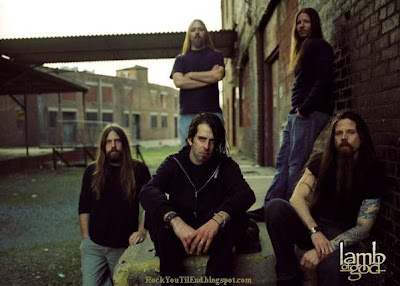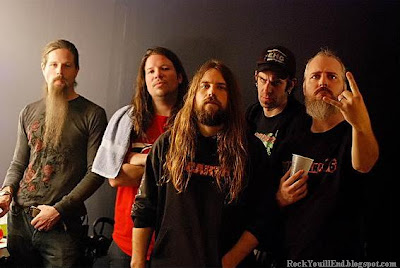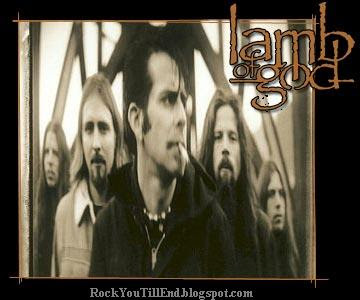
Lamb Of God
The roots of Lamb of God were planted in 1990 when Chris Adler, Mark Morton and John Campbell were floor mates at a Virginia Commonwealth University dormitory. Four years later (1994) the trio met up at Chris's rental house in Church Hill, Richmond to make some noise. "There was no heat at the house," recalls Campbell. "Kerosene fumes and Black Label beer were definitely what fueled our early days.
"
"I couldn't afford to heat the house. We could see each other's breath when we played" recalls Adler. "It was rough, but in retrospect this was the perfect setting to prove our dedication to the aggressive music we wrote." After graduation, Morton moved to Chicago to pursue a master's degree, but the band continued. A new guitarist, Abe Spear, quickly replaced Morton. Soon after the band retired its instrumental sound and added Randy Blythe on vocals.
The quartet, known then as Burn the Priest, became a fixture in the tightly-knit Richmond music scene. To compete with the high-level of musicianship displayed by their contemporaries, the band adopted a rigid practice schedule. "To this day, we practice five days a week," says Campbell. "Many of the bands in Richmond can flat outplay you and if you don't practice, they will blow you off the stage. They inspired us to raise the bar musically and taught us the work ethic we needed to be a success."
The band worked incessantly, rehearsing and booking small shows across the country for the next three years. "John and I would screen print shirts at my apartment in hopes of selling them at shows for gas money to the next show," recalls Adler. The band got in early and made good use of the internet. Even without a record label or a full-length release, the band became the most downloaded metal act at the popular music-sharing site MP3.com. In 1997, Morton moved back from Chicago and soon after re-joined the group. Burn the Priest released a self-titled full-length album on Legion Records in 1998. Two years of DIY touring followed. The band played hundreds of shows during this time including several shows at the legendary CBGB's in Manhattan as well as multiple appearances at the well-known Milwaukee Metal Festival.
In early 2000, Abe amicably left the band to pursue a new career. This opened a spot for guitarist. Chris's younger brother Willie had recently moved back to Virginia from a stint in Seattle, WA. Knowing his talent and ability first hand, Chris called him to Richmond to audition. There were no additional auditions.
With the change in blood, a new energy and potential, Burn the Priest changed its name to Lamb of God and signed a record deal with Prosthetic Records. The newly monikered band's debut, New American Gospel, was released in 2000. "This album was all about creating a rhythmic and pummeling musical landscape," explains Morton. Drummer Adler notes: "This is a classic record. We had all the elements come together to make one of the heaviest, yet contagious records of our career. It was difficult to contain us - we didn't even understand at the time what we had created."

Lamb Of God
Another two years of extensive touring in support of the album raised Lamb of God's profile before the band buckled down to write and release the critically acclaimed, As The Palaces Burn (2003). As The Palaces Burn won record of the year honors in such notable magazines as Revolver and Metal Hammer while garnering positive mainstream press in Rolling Stone and Entertainment Weekly.
The band hit the road again and began headlining tours across the globe. In the fall of 2003 Lamb of God was a co-headliner on the first ever MTV's Headbanger's Ball Tour which continued to elevate the popularity and visibility of the band. Terror and Hubris, a DVD featuring early live performances, videos for "Ruin" and "Black Label" and behind-the-scenes footage highlighting the work ethic, humility and sense of humor of one of the most respected and influential bands around was released during the touring cycle. The DVD proved to be a commercial success as it entered the Billboard Music DVD Charts at #32.
Gradually, Lamb of God's persistence paid off. Their 2003 disc, As The Palaces Burn earned them a new level of respect and admiration, but it was 2004's virulent major label debut (Epic Records) Ashes of the Wake that turned the band into true contenders for the metal throne. Revolver magazine voted it the album of the year, a Guitar World readers poll deemed it best metal album and awarded the band "most valuable players," "best shredders" and "best riffs." The video for "Now You've Got Something to Die For" earned "best video" from both MTV and Revolver. A DVD chronicling the tour and life on the road with the band, Killadelphia, now certified Platinum by the RIAA, was released in 2005 creating a feeding frenzy for the bands live show. Lamb of God supported Ashes of the Wake with relentless touring, now playing mostly arenas and festivals, starting with a headlining run on Second Stage at Ozzfest 2004, and ending by headlining the North American Sounds of The Underground Festival in 2005.

The political angst that fueled the lyrics on As The Palaces Burn continues unabated on Ashes of the Wake. However, Blythe admits that his plans to write songs about personal responsibility quickly changed. "At the start of this album we agreed that we wanted to concentrate on internal instead of external politics," he explains. "But as we got into it, considering the condition of the world today, we felt obligated as responsible artists to give accurate social commentary, and that meant writing a few indictments against the powers that be."
Mixing a call to arms with a sneering disdain balances Ashes of the Wake. "In the end, I think the album is stronger because we show the relation between internal and external politics instead of just focusing on one or the other," Blythe says. "These songs are a reality check for everyone because they rail against a wrong-headed government and against the apathetic people that ignore the government and allow it to exist."
After Ashes of the Wake, they had been praised as one of the leaders of the new American metal movement, and while they were flattered to be considered part of something so influential, this time they wanted to stand alone. "I believe it's important for us to create a legacy for this band, and I don't want that legacy to be in association with anyone else," drummer Chris Adler commented.
Towards the end of 2005, the band stopped all touring and came home to Richmond, VA, to begin writing the next chapter. An intense 8-month writing process followed. "We pretty much killed ourselves working on it five to six days a week for six to eight hours a day," says Adler. "It was important to push ourselves into uncomfortable territory as players. A lot of times one of us would say, 'I'm not sure if I can play that.' The typical response was, 'Well, you've got a few months to figure it out.' We pushed ourselves to step it up and threw out a lot of decent material because we were insisting on only the best." One reason Lamb of God pushed so hard is because they wanted to create something that couldn't be classified, categorized or marginalized.
August 22, 2006 brought Sacrament, a stunning example of how diverse, articulate and pummeling metal can be. It's a record that emphasizes just how far the band members have come as players, writers and people and stands as a true testament of triumph over adversity. With Sacrament, Lamb of God has stoked the flames even higher than their previous works had blazed. The songs are bleak and dark, yet key ingredients of a ride that's as breathless, exhilarating and terrifying as an overdose.
Guitarist and co-lyricist Mark Morton notes the band chose the name Sacrament based on a specific lyrical reference as well as a more general symbolic perspective. "It employs the idea of the traditional religious Sacrament, which is something you do as ritual to get to a different level of your faith," he says. "It was also symbolic in terms of us putting out another record and getting to the next stage of our musical development."
"This is definitely a personal record and it's the darkest thing we've ever done," adds Blythe. "It stems from a lot of depression and a bleak worldview. In the last couple years I've been going through a lot of intense personal issues."

Lamb Of God
The biggest difference between Sacrament and Ashes of the Wake is the lyrical content. In the past, Lamb of God has lyrically been motivated by the hypocrisy, greed and turmoil of politics and politicians. This time the band turned within to reveal an even greater source of despair and frustration. Songs like 'Pathetic' and 'Descending' for instance are about the whirlpool of addiction and alcoholism, 'Walk With Me In Hell' addresses the destruction of codependency and 'Blacken the Cursed Sun' confronts suicidal depression.
"The lyrics were so intense for me, when I was recording, it was like breathing pain instead of air," Blythe says. " Once it was done, I couldn't listen to the record for another two months. It took so much out of me to get all this out, I didn't want to touch it right away."
In addition to being undeniably heavy in many ways, Sacrament is a sincere expression of the turmoil that has tumbled through the last few years of the band's existence. In an era of stagnant, contrived metal, Lamb of God is a harrowing rush of honesty, a declaration that no matter what anyone else is playing, Lamb of God will always follow their own hearts.
The release was far more than a work of self-indulgence. Sacrament landed at number 8 on the Billboard Top 10 in its very first week of release. The record went on to become the top selling metal record of the next 2 years and, as As The Palaces Burn was in 2003, Sacrament was voted the #1 Metal Album of the Year in Revolver Magazine. The reviews both from the media and from fans were overwhelmingly positive. "We hit a nerve," commented Adler. "This music and the lyrics within Sacrament speak and cut deeply. This is an intense record and comes at an important time in our lives and the world we live in."
By the end of 2006 the band had shattered every goal most metal bands can expect to attain. Despite this, the music industry had in large part ignored them. This was about to change. The band and the overwhelming grass roots following would no longer go unnoticed. Sacrament and Lamb of God were nominated for a Grammy in best category of best Metal Performance. In January of 2007 the band appeared on the Late Show with Conan O'Brien. Borders could not stop the growth. In the UK the band was honored with 5 nominations at the Golden Gods awards and the band went on to tour the world three times over the next 2 years, finishing off the touring cycle headlining arenas across the US in December of 2007.
Lamb of God is now home in Richmond, VA writing new material and preparing to enter the studio in the fall of 2008 to record the follow-up to Sacrament.
On July 1, 2008 the band will release the highly anticipated DVD follow-up to Killadelphia entitled 'Walk With Me In Hell.'

"We're on stage for 90 minutes a day," says drummer Chris Adler. "People want to know what's going on for the other 22 and 1/2 hours. It's not always limousines and champagne. Killadelphia surprised a lot of people and proved that we refuse to censor or hold anything back. True to the high standard that we hold ourselves to, 'Walk With Me In Hell' is unlike any music DVD I've ever seen. This is an entire new level of documentary taking you on an intense, worldwide journey with us. This is a very proud moment for us as a band. It's hard to comprehend the pain and glory when you're in the middle of it, but looking back over the past two years we can begin to understand how huge this record and touring cycle was," says Adler. "It shows the blood shed and what it takes to not only hold our own, but succeed in the face of every obstacle in front of us. We have never offered less than our best, our fans expect and deserve it, and this DVD will serve as a landmark for all that follow."
While huge expectations and pressures abound, the band manages to remain unaffected. "This band was started because no one out there was making the music that we wanted to hear," singer Randy Blythe says. "So, we decided to make that music, and from that point it has just been a continuation of that philosophy. We had never changed anything we do to appeal to anyone, appease anyone or seek any sort of approval from anyone other than ourselves."



No comments:
Post a Comment